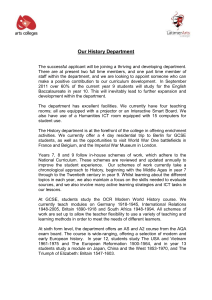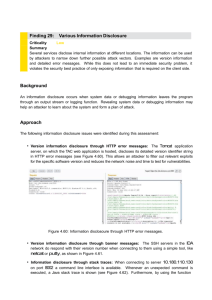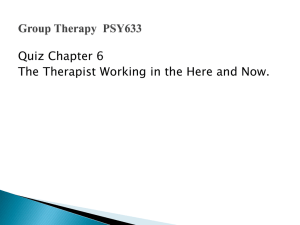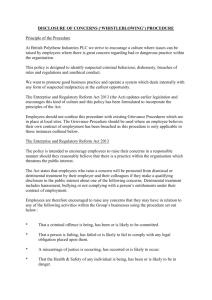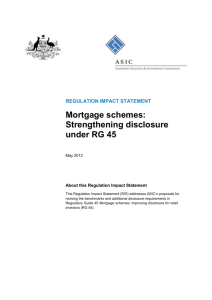Confidentiality of Health Information
advertisement
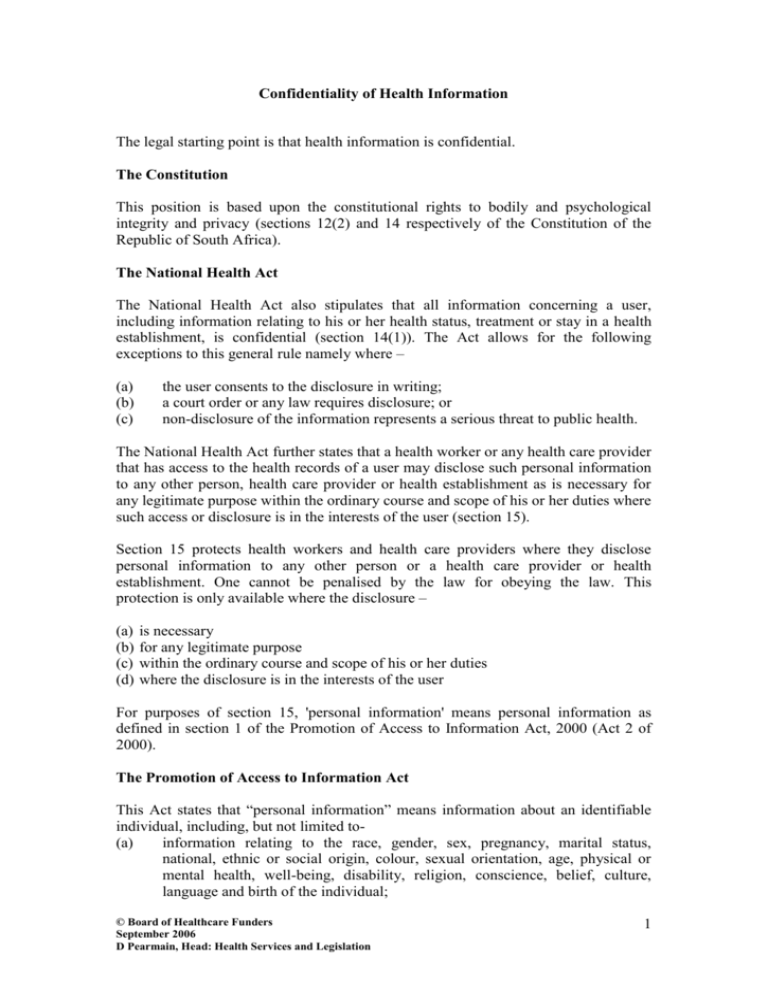
Confidentiality of Health Information The legal starting point is that health information is confidential. The Constitution This position is based upon the constitutional rights to bodily and psychological integrity and privacy (sections 12(2) and 14 respectively of the Constitution of the Republic of South Africa). The National Health Act The National Health Act also stipulates that all information concerning a user, including information relating to his or her health status, treatment or stay in a health establishment, is confidential (section 14(1)). The Act allows for the following exceptions to this general rule namely where – (a) (b) (c) the user consents to the disclosure in writing; a court order or any law requires disclosure; or non-disclosure of the information represents a serious threat to public health. The National Health Act further states that a health worker or any health care provider that has access to the health records of a user may disclose such personal information to any other person, health care provider or health establishment as is necessary for any legitimate purpose within the ordinary course and scope of his or her duties where such access or disclosure is in the interests of the user (section 15). Section 15 protects health workers and health care providers where they disclose personal information to any other person or a health care provider or health establishment. One cannot be penalised by the law for obeying the law. This protection is only available where the disclosure – (a) (b) (c) (d) is necessary for any legitimate purpose within the ordinary course and scope of his or her duties where the disclosure is in the interests of the user For purposes of section 15, 'personal information' means personal information as defined in section 1 of the Promotion of Access to Information Act, 2000 (Act 2 of 2000). The Promotion of Access to Information Act This Act states that “personal information” means information about an identifiable individual, including, but not limited to(a) information relating to the race, gender, sex, pregnancy, marital status, national, ethnic or social origin, colour, sexual orientation, age, physical or mental health, well-being, disability, religion, conscience, belief, culture, language and birth of the individual; © Board of Healthcare Funders September 2006 D Pearmain, Head: Health Services and Legislation 1 (b) (c) (d) (e) (e) (f) (g) (h) (i) information relating to the education or the medical, criminal or employment history of the individual or information relating to financial transactions in which the individual has been involved; any identifying number, symbol or other particular assigned to the individual; the address, fingerprints or blood type of the individual; any identifying number, symbol or other particular assigned to the individual. the personal opinions, views or preferences of the individual, except where they are about another individual or about a proposal for a grant, an award or a prize to be made to another individual; correspondence sent by the individual that is implicitly or explicitly of a private or confidential nature or further correspondence that would reveal the contents of the original correspondence; the views or opinions of another individual about the individual; the views or opinions of another individual about a proposal for a grant, an award or a prize to be made to the individual, but excluding the name of the other individual where it appears with the views or opinions of the other individual; and the name of the individual where it appears with other personal information relating to the individual or where the disclosure of the name itself would reveal information about the individual, but excludes information about an individual who has been dead for more than 20 years. The Medical Schemes Act Section 59(1) of the Medical Schemes Act states that a supplier of a service who has rendered any service to a beneficiary in terms of which an account has been rendered, shall, notwithstanding the provisions of any other law, furnish to the member concerned an account or statement reflecting such particulars as may be prescribed. Regulation 5 of the General Regulations to the Medical Schemes Act requires that the account or statement contemplated in section 59(1) of the Medical Schemes Act must contain the following: (a) The surname and initials of the member; (b) the surname, first name and other initials, if any, of the patient; (c) the name of the medical scheme concerned; (d) the membership number of the member; (e) the practice code number, group practice number and individual provider registration number issued by the registering authorities for providers, if applicable, of the supplier of service and, in the case of a group practice, the name of the practitioner who provided the service; (f) the relevant diagnostic and such other item code numbers that relate to such relevant health service; (g) the date on which each relevant health service was rendered; (h) the nature and cost of each relevant health service rendered, including the supply of medicine to the member concerned or to a dependant of that member; and the name, quantity and dosage of and net amount payable by the member in respect of the medicine; © Board of Healthcare Funders September 2006 D Pearmain, Head: Health Services and Legislation 2 (i) (j) (k) (i) where a pharmacist supplies medicine according to a prescription to a member or to a dependant of a member of a medical scheme, a copy of the original prescription or a certified copy of such prescription, if the scheme requires it; where mention is made in such account or statement of the use of a theatre(i) the name and relevant practice number and provider number contemplated in paragraph (e) of the medical practitioner or dentist who performed the operation; (ii) the name or names and the relevant practice number and provider number contemplated in paragraph (e) of every medical practitioner or dentist who assisted in the performance of the operation; and (iii) all procedures carried out together with the relevant item code number contemplated in paragraph (f); and in the case of a first account or statement in respect of orthodontic treatment or other advanced dentistry, a treatment plan indicatingthe expected total amount in respect of the treatment; (ii) the expected duration of the treatment; (iii) the initial amount payable; and the monthly amount payable. Conclusions The fact that the obligation in section 59(1) of the Medical Schemes Act is to furnish the account to the member does not detract from the argument that the disclosure is lawful. It is clearly for the purpose of claiming from the member’s medical scheme that this information is required to be reflected on the statement. This is borne out by the very next subsection in section 59 which states that a medical scheme shall, in the case where an account has been rendered, subject to the provisions of the Act and the rules of the medical scheme concerned, pay to a member or a supplier of service, any benefit owing to that member or supplier of service within 30 days after the day on which the claim in respect of such benefit was received by the medical scheme. It is as much for the convenience of the health care provider as it is for the member that the account is usually submitted directly to the medical scheme without first being sent to the member for onward transmission. It must also be borne in mind that it is within the power of the member, to expressly or tacitly consent to the submission of the account directly to the medical scheme or its administrators. The legal obligation to furnish an account to the member is not diminished by this. By completing a form giving his or her medical scheme details, by furnishing the health care provider with proof of membership of a medical scheme, by obtaining preauthorisation for a particular medical procedure from the scheme, the member clearly indicates a desire for the account to be submitted to his or her medical scheme. Otherwise why would he or she furnish such information? She could pay the account and submit the claim herself without supplying her medical scheme details to the health care provider. In terms of the common law, consent can be implied by a person’s conduct or words or expressed in writing. The fact that the National Health Act requires in section 14 that the consent to the disclosure to be in writing must be weighed against the fact that in section 15 it also permits the disclosure of a user’s personal information to “any other person” within the ordinary course and scope of his or her duties where such © Board of Healthcare Funders September 2006 D Pearmain, Head: Health Services and Legislation 3 access or disclosure is in the interests of the user. The provisions of section 14(2) are made subject to those of section 15 in the Act. The submission of an account or statement to the user’s medical scheme instead of requiring him or her to pay it up front and then claim a refund is clearly in most instances in the interests of the user. It is not outside the ordinary course and scope of the health care provider’s duties to render and account or statement since this is required of him or her in terms of section 59 of the Medical Schemes Act. The relevant diagnostic codes and other item code numbers that relate to the relevant health service, the nature and cost of each relevant health service rendered and the date on which the service was rendered would all be personal information as contemplated in section 14 of the National Health Act. However the Medical Schemes Act, which in the event of a conflict with the National Health Act takes precedence over it, requires that this information appears on the health care provider’s account or statement. Since this is a legal requirement, a provider cannot refuse to provide the information required in terms of regulation 5 on the grounds of confidentiality, despite the fact that the member is not necessarily the patient. In the health context, therefore, information about a patient’s 1. 2. 3. race, gender, sex, pregnancy, marital status, national, ethnic or social origin, colour, sexual orientation, age, physical or mental health, well-being, disability, religion, conscience, belief, culture, language and birth; medical history; blood type may lawfully be conveyed by a health care provider to a medical scheme for the purpose of payment of an account by the medical scheme or any other purpose that falls within the definition of the business of a medical scheme as it appears in section 1 of the Medical Schemes Act (Act No 131 of 1998). This would satisfy the requirement of a legitimate purpose for the disclosure in section 15 of the National Health Act since the legislature itself has legitimated this purpose in passing the Medical Schemes Act. © Board of Healthcare Funders September 2006 D Pearmain, Head: Health Services and Legislation 4


